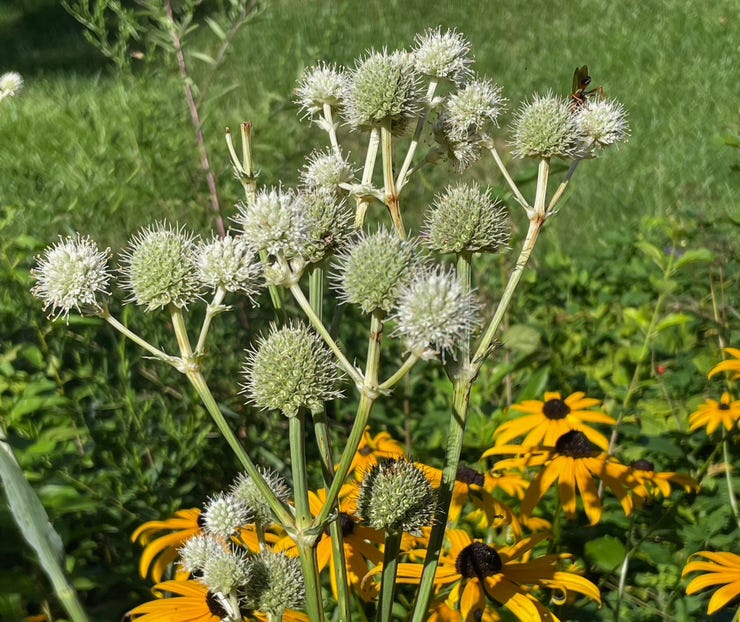Refugia Newsletter #6 by Debra Rienstra: temps, plastics, and some winter love
Refugia News
First the bad--but not too bad--news: Publication date for Refugia Faith is now backed up to Feb. 22. Yep, it's down to supply chain issues with paper.
But the good news: my editor just let me know that there will be an audio book! No word yet on who will be doing the reading. Don't you think we need birdsong sound effects, though?
This Week in Climate News
Two unsurprising but important stories in The Washington Post this week. Average air and ocean temperatures continue to rise. "The year 2021 was the seventh in a row in which global temperatures were more than 1 degree Celsius above the preindustrial average. It’s unlikely anyone alive will see the world’s temperature drop below that 1-degree benchmark again," noted the story from January 14, written by Sarah Kaplan with graphics by John Muyskens.
Meanwhile, more new data confirms ocean-temp rise continues as well: "A new analysis, published Tuesday in the journal Advances in Atmospheric Sciences, showed that oceans contained the most heat energy in 2021 since measurements began six decades ago — accelerating at a rate only possible because of human-emitted greenhouse gases." (See link below to story by Kasha Patel.)
Hotter temperatures on land produce obvious dire effects. The ocean "tries" to absorb the greenhouse gases we pump into the atmosphere, but can only absorb so much of it, and the absorption causes water temps to rise. In the ocean, warmer temps put stress on marine ecosystems, promote larger, more extreme storms, and exacerbate ocean level rise (because warmer water expands).
Shout out to family friend and Calvin University alum John Muyskens for his graphics work on the Jan. 14 story!
Deeper Dive
Plastics: so convenient, so versatile, and so problematic from top to bottom. A deep-dive article in The Atlantic this week by Rebecca Altman offers a brief history of the plastics industry and a clear account of how, exactly, plastics are related to climate change. In short, plastics manufacturing is how fossil fuel companies are hoping to stay profitable even as investors turn away and we make the turn toward clean energy. Recycling, sadly, is not the answer, either.
"Plastics are now made in a highly integrated network of refineries, crackers, and petrochemical plants—complexes that have been retrofitted or relocated to better tap new or different oil and gas deposits. Today, 98 to 99 percent—that is to say, most plastics—are manufactured from fossil fuels." And that's only one of the problems.
Refugia Sighting
Something fun and metaphorical this time. My husband reminded me of a song by artist David Wilcox from his 1997 album Turning Point. "Waffle House" is a wry, cheeky, oddly poignant song about what goes on in the dead of night at those diner-type waffle joints you can find all over the American South.
The song is not really about pancakes and scrambled eggs, though. It's about refugia. Ron (my husband-person) has long claimed that the way this song depicts the waffle house works as a metaphor for what the church should be, and I think he's right:
"If you're facing some bitter truth / We'll save you a window booth / And we will be waiting for you / When you run from your home / When the silence of sorrow won't leave you alone ... [you] / Can stay until the feeling goes / As long as there's broken hearts and dreams / And all of this highway in between / The waffle house will never close."
The Wayback Machine
Remember before the pandemic, when blizzards meant snow days, and snow days meant solitude and quiet unmarred by Zoom meetings? Yeah, well, here's a piece I wrote in early 2019 that revels in the beauty of deep winter. (Inside scoop: an edited version of this essay is now part of Chapter 2 in Refugia Faith.)
Thank you!
Thanks for reading! I keep these newsletters quickly scannable, with opportunities for deeper reading as you are able. I also tend to emphasize the connections between faith communities and climate action.
If you are so inclined, please follow me on Twitter or Facebook @debrakrienstra. You can always contact me on those platforms. Also check out my website at debrarienstra.com.
If you like this newsletter, please share with others!




